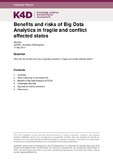Benefits and Risks of Big Data Analytics in Fragile and Conflict Affected States
Abstract
Big Data is an umbrella term for the large amounts of digital data continually generated by the global population. The main sources are data exhaust (largely from the use of mobile phones), online information (e.g. social media), physical sensors (e.g. satellite imagery) and crowdsourced data (from citizens). Big Data for Development refers to sources of Big Data relevant to policy and programming of development programmes. Such data has the following features: digitally generated, passively produced, automatically collected, geographically or temporally trackable, and continuously analysed. Big Data analytics refers to the process of turning raw data into actionable information. The biggest source of Big Data is data exhaust, much of which is held by the private sector. Donor interest in Big Data for Development has increased hugely in recent years. Big Data for Development has potential applications in numerous sectors, notably health, education, financial services and agriculture. It can be especially useful in fragile and conflict-affected states where, for multiple reasons (insecurity, lack of capacity, population movements, etc.), availability of traditional data (e.g. official statistics) tends to be very limited. The speed with which Big Data is generated can reduce the time lag between the start of a trend/development and when governments and other authorities are able to respond; it can also reduce the knowledge gap about how people respond to these trends.
Citation
Idris, I. (2019). Benefits and risks of Big Data Analytics in Fragile and Conflict Affected States. K4D Helpdesk Report 605. Brighton, UK: Institute of Development StudiesIs part of series
K4D Helpdesk Report;605Rights holder
© DFID - Crown copyright 2019Collections
- K4D [937]

